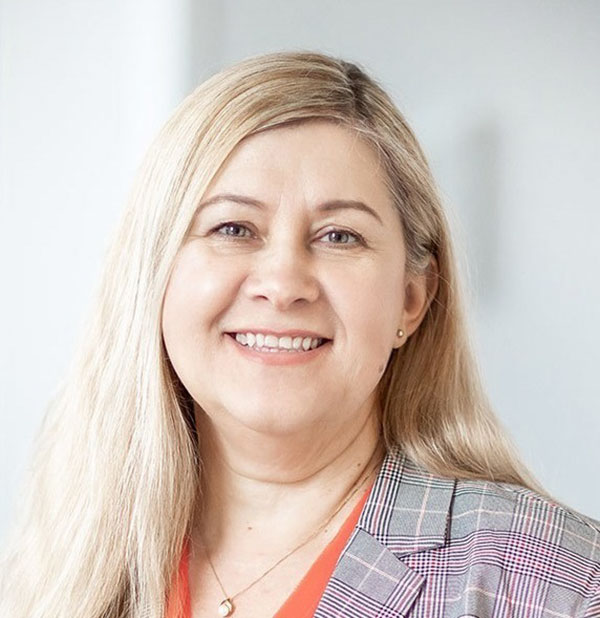
Inna Gogina
When students learn about the Holocaust for the first time by watching testimony from the USC Shoah Foundation, Inna Gogina knows exactly how they feel. She, too, didn’t know about the Holocaust – until she began working for the USC Shoah Foundation.
Originally from Sumy, Ukraine, Gogina has worked at the USC Shoah Foundation in a variety of capacities since 1999, including assistant production coordinator, historical content analyst, coordinator of international programs, and, currently, international digital education specialist. She works with webmaster Jeffrey Langham to manage the 12 international “portals” on the USC Shoah Foundation website, which provide educational materials and other testimony-based resources for educators in French, Hungarian, Italian, Chinese, Polish, Ukrainian, and more.
Gogina received her bachelor’s and master’s degrees in classical philology (linguistics) from Moscow State University and began her career as a professor of Latin in Ukraine. Gogina is fluent in English, Russian, Latin and Ukrainian, and also has a scholarly knowledge of German and ancient and modern Greek. She also has a master’s degree in public administration from California State University, Northridge.
When she immigrated to the United States in 1999, she was attracted to the production coordinator job (coordinating the collection of testimonies in Central and Eastern Europe) at the then-titled Survivors of the Shoah Visual History Foundation because it would draw on her language skills and background. But the subject matter was also very personal to her.
“I did not know about the Holocaust when I was growing up. The scope of mass atrocities [during World War II] was known, but Soviet historians and educators were instructed to avoid stating that the victims of the massacres had been Jews, substituting instead the innocuous code-phrase ‘peaceful Soviet citizens,’ Gogina said. “While working at the Shoah Foundation I realized the true nature of the Nazi persecution and the genocide that occurred during the war. Even though I thought I knew the history of Ukraine, I realized that I didn’t know all of it. That was a major eye-opener for me.”
The international portals have grown significantly over the years in size and scope. Gogina and USC Shoah Foundation’s international consultants, based in France, Hungary, Poland, Czech Republic and Ukraine, work together to coordinate the development of teacher’s guides and multimedia resources in different languages that utilize testimony from the Visual History Archive, and then make them available for free on the portals. Recent publications have included the Italian online exhibit Giving Memory a Future: The Sinti and Roma in Italy and around the World and the Ukrainian guide Where Do Human Rights Begin: Lessons of History and Contemporary Approaches.
“The portals have excellent educational resources and multimedia for use anywhere around the globe,” Gogina said. “They help the Institute maintain a global presence in education.”
Inspired by her work at the USC Shoah Foundation, Gogina is continuing her education by working toward a master’s in library and information sciences from San Jose State University, focusing on digital services and emerging technologies. She is already applying the new web and digital skills she has learned to her work, such as helping the IWitness team with its recent move out of beta.
Gogina said her work at the USC Shoah Foundation is driven by her desire to help others learn about their own country’s history, because she did not have that opportunity.
“Everyone should learn the history of their homeland,” Gogina said. “It is through my work with testimonies that I have truly seen the transformative potential of eyewitness stories—not only in our target audiences, but in my own life as well. It is thanks to them that I learned history of my home country, Ukraine—the history I didn't know while growing up. Bringing this part of history home has been the most rewarding part of my work.”